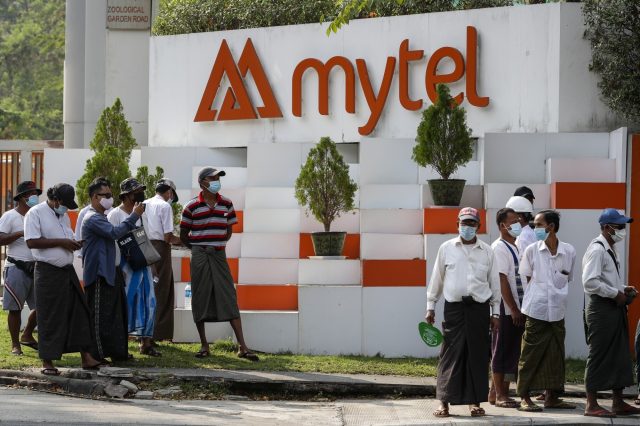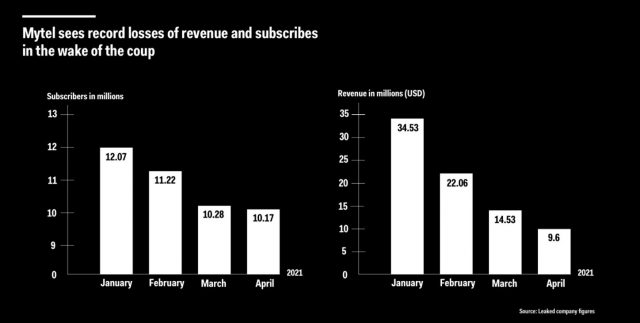Anti-coup movement cost junta-owned telecoms company $25m, activists say
06 November 2021


Military supporters gather in front of Mytel headquarters in Yangon for a protest against Union Election Commission near Shwedagon pagoda on January 30, two days prior to the coup (EPA)
Justice For Myanmar reports that Mytel suffered major financial losses in the three months after the military coup due to a boycott campaign
By Myanmar Now
Telecommunications provider Mytel lost nearly US$25m in profits and millions of customers in the three months that followed the February 1 coup, activist group Justice for Myanmar (JFM) announced on Friday.
The losses were due to boycotts by both users and shops due to the company’s ties to the junta; Mytel is jointly owned by the Myanmar military and Viettel, under Vietnam’s defence ministry.
Boycotts launched after the coup by the public called for Mytel sim cards to be destroyed, a refusal to accept calls from those using Mytel mobile numbers, and a blacklisting of Mytel products by shops. Signboards and banners advertising Mytel were also removed and destroyed.
The company lost staff to mass resignations, too, according to JFM. Mytel’s sales representatives dropped by around 30 percent in six months from more than 54,400 in January to around 38,190 in July.
Citing leaked data, JFM said that some 80 percent of Mytel’s sales came from private mobile phone shops nationwide.

(Justice For Myanmar)
A mobile phone shop owner from Mawlamyaine in Mon State told Myanmar Now that they destroyed 700,000 kyat (nearly $390) worth of Mytel top-up cards and sim cards in the days immediately after the coup.
“We never used Mytel but we had to sell their products because we’re a phone shop,” the shop owner said. “We’re not going to sell them again. We don’t even accept phone calls from Mytel numbers.”
The owner said that some wholesale shops have continued to offer Mytel products, since the company has offered incentives—such as new phones, power banks, and even a new Hyundai car—if they meet certain sales benchmarks.
“Turning down their offers would mean great losses for the wholesale businesses. Therefore, I’m sure they won’t be boycotting them. Several retail stores are part of the movement, though,” he explained.
He said he hoped that other shops and users would participate in the boycott campaign.
“We can’t only think about our own interests at a time like this. The whole country is in peril and we can’t give them the money they will use to buy ammunition,” he said. “I am going to boycott them no matter how hard it gets for us or no matter what incentives they offer us.”
“I want everyone else to boycott them, too,” he added.
Another staff member from a Mytel shop in Mon State said that while users have widely stopped using the provider’s services in other states and regions, sales in Mon State had actually gone up around 30 percent since the coup.
He attributed this to the reliability of Mytel’s signal in rural areas where other operators, such as MPT, Ooredoo and Telenor, offer less stable connections.
Mytel has also been offering internet data packages and top-ups at half-price during the boycott campaign, the staff member added.
He estimated that use of Mytel’s wifi doubled in Mon State when the military council cut off mobile internet services on March 15, amid a crackdown on anti-coup protests.
“Mytel likely gained subscribers by selectively implementing the military’s own shutdown orders, maintaining internet access for users when other subscribers were in the dark,” JFM wrote, adding, “Mytel has deployed costly and illegal strategies that undercut the market, breach telecommunications regulations and hurt their own staff.”
JFM’s analysis of the Myanmar Investment Commission reveals that the junta is expected to earn more than $700m from Mytel over the next decade, according to the whistleblower site Distributed Denial of Secrets.
Mytel is 49 percent owned by Viettel, with the remaining shares owned by Star High—28 percent—under the junta-run Myanmar Economic Corporation, and 23 percent by Myanmar National Telecom Holding.
The company had not responded to JFM’s statement at the time of reporting.
Mytel telecoms towers have been targeted for attack nationwide by anti-junta resistance forces in recent months, using bombs and makeshift explosive devices at the sites. The military responded by laying landmines around towers, engineers on strike in accordance with the Civil Disobedience Movement told Myanmar Now.
Former military officer and Mytel executive Thein Aung was shot dead near his Yangon home on Thursday morning, in what some speculated was an inside job. Myanmar Now was unable to verify those claims.
Original Post: Myanmar Now
Announcements
28 February 2025
Asian NGO Network on National Human Rights Institutions , CSO Working Group on Independent National Human Rights Institution (Burma/Myanmar)
Open letter: Removal of the membership of the dis-accredited Myanmar National Human Rights Commission from the Southeast Asia National Human Rights Institution Forum

Progressive Voice is a participatory rights-based policy research and advocacy organization rooted in civil society, that maintains strong networks and relationships with grassroots organizations and community-based organizations throughout Myanmar. It acts as a bridge to the international community and international policymakers by amplifying voices from the ground, and advocating for a rights-based policy narrative.